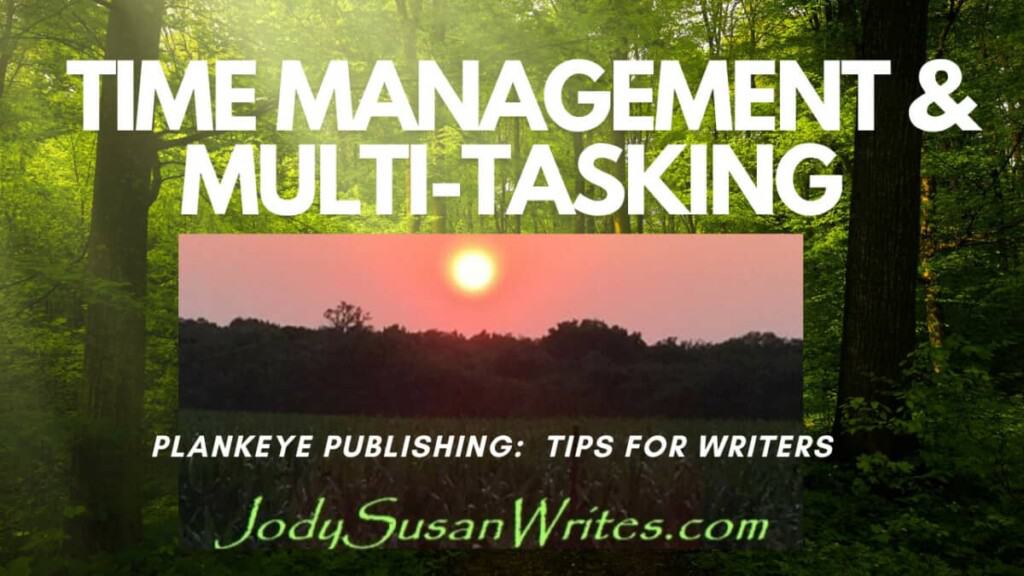This post may contain affiliate links.

Writing is a creative endeavor; but to make it a realistic achievement (or career), efficiency is a key component. We each have twenty-four hours a day. There is only so much we can juggle at once.
Too often, the tentacles of technology reach toward us, like multiple arms of an octopus, saying, “Look at all you could achieve, if you’d just add one more task.”
When it comes to becoming published authors, we are inundated with strategies for success.
We’re advised to:
- engage in social media
- add a blog
- incorporate ads
- upload images
- get a coach
- record videos
- write with our non-dominant hand
- network with people in our niche
- prepare podcasts
- find affiliates
The list of options for what would-be authors ought to do, if they want to excel, is unending.
What we started doing, to become writers,
can become the very thing
that’s keeping us from actually writing.
That octopus of pressure to over-achieve in every area gets a hold of our time, and takes it away. Before we know it, the ink we thought would be used to tell our stories, is really just making everything around us murky.
Maybe it’s even a form of self-protection – like a decoy expelled to delay the exposure of the deeper story inside of us.
Like with an octopus, all those extra tasks outside of writing may take the shape and form of what looks like us becoming authors; but really, we are quickly swimming away.
Advice to Writers: Have a Plan Before Purchasing Writing Products and Services
Last night, I got an email from InfoStack, saying there is a writing seminar online today.
It was nice to see an email before an event, rather than weeks later.
I was glad I’d made some advances in emptying out my inbox.
As I contemplated signing up for the session that starts at one p.m. today, I thought about the huge stack of online materials I’d bought from them a couple of years ago, and decided to take a look and see if one of the books would come in handy right now.

The word “Expired”, printed on every picture, made me exhale in frustration with myself.
Every one of the fifty-one writing products I’d paid $49 for had expired – over two years ago! How had time flown by like that!?
I’d bought my Stack, determined to improve my chances at being a writer; but hadn’t implemented a plan for how I would work through the information I had at my finger tips. I remember starting one of the books; but as for finishing it…
Well, that’s a blur.
Admittedly, there were probably too many other things to juggle at the time.
My mom broke her arm, and it was all hands on deck.
She broke her foot, and lending her an elbow became more important than writing.
She slowed down.
We didn’t know we were quickly approaching a pancreatic cancer diagnosis.
Life happened.
And then came death.
My InfoStack sat neglected.
Now it’s expired.
Did I waste Forty-nine dollars buying it?
Normally I would say, “Yes”; but at this point, I don’t know for sure.
Perhaps the lesson in not trying to do too many things is worth more than a fifty-dollar bill. Granted, I wish I had the cash back; but maybe it’s a cheap course in higher education to set a better pace for what I sign up for.
Sorry, can I just pause and ask, “Did you notice that pun!?”
Get it fifty-dollar bill – Granted.
I’m such a nerd.
I noticed last night that InfoStack has another writing bundle available for five more days.
Is that fortuitous timing, or more temptation?
I can’t tell.
I’m contemplating another forty-nine dollar purchase on a second try. This one’s called, “The Nonfiction Writer’s Super Stack”. It looks good; but should I go for it?
I’m going to sit back for a few days and contemplate my plan before I pull out my credit card. By then, I’ll have a better idea just how many things I’ll be juggling in the near future.
Advice to Writers: It’s More Helpful to Focus on One Handful and Have the Other Hand Free
The words of the man who was considered to be the wisest in the world, King Solomon, keep coming to mind during this busy season of life:
Better is an handful with quietness, than both the hands full with travail and vexation of spirit.
Ecclesiastes 4:6
Solomon said that long before “Hands Free” was a household phrase.
In my own writing journey, I’m trying not to carry more than I can.
I have committed to start The 90-Day Memoir with Alan Watt, and signed up for a series of writing classes on Short Stories, Memoir, and Poetry which will take place concurrently with Al’s class. I’m also still trying to keep content trickling out on this blog, as I work through Project 24.
Would it be wise for me to make another purchase with InfoStack right now? It seems a little much; but at this point in my website build with Project 24, I’m supposed to be working on networking in my niche, which is writing, so maybe the InfoStack is a good option and right on course…
Was that a run-on sentence?
Probably so…
I know my mind keeps running on and on, weighing options, trying to nail down strategies and schedules – and actually stick them out…
Ironically, I seem to get much more done when I set out determined to do less,
than when I try to accomplish so much more.
Even when I make margins for myself, life tosses more curveballs.
I’d rather recognize that fact, and have one hand free to catch the unexpected, than be bumbling and scrambling, dropping the ball on all my self-imposed expectations.
Advice to Writers: There Will Always Be More Books – Be Wary of Wearing Yourself Out
I have five days left before the sale of this InfoStack ends.
I’m going to give myself until the deadline to consider how and when I could put the books to use before I hit purchase. I know the information will be useful; but the real question is, will I use it!?
If I can manage to set some reasonable benchmarks for focusing on the books, I’m going to go ahead and buy the Stack; but I’m not going to make myself read every book.
I’m realizing it would be better to delve into just a couple of concepts at a time, and really digest them, than to try to read everything and not get anything done.
More of King Solomon’s words come to mind:
And further, by these, my son, be admonished: of making many books there is no end; and much study is a weariness of the flesh.
Ecclesiastes 12:12
I’m determined not to wear myself out with trying to absorb too much information at one time.
I can be so determined to write the right way, that I’m tempted to spend more time reading about writing than actually writing.
It’s scary to think of someone reading my writing, and that desire to make things perfect by “studying my craft” can really come down to another form of procrastination.
Reading about writing shouldn’t be what keeps me from putting my fingers on the keyboard and forming a body of work.
Advice to Writers: Don’t Feel Like You Have to Read Every Book About Writing
Writers are usually readers.
If a writer wants to sell a book, the audience of wanna-be writers is a great place to start. That’s probably why so many are produced.
Maybe that’s the real reason I’m writing this post.
It’s so much easier to tap out writing advice on this keyboard
than to keep writing novels that only my hard drive reads.
It’s exhausting to see how many different works there are on writing.
A lot are probably produced by writers realizing their stories aren’t going places. They figure the storehouse of knowledge they’ve learned along the way will sell, even if their novel never lands in a bookstore.
Would-be writers pick up these publications, impressed by their existence – the cover promises some novelty of information – a writing innovation. They set down their manuscript, so they can study the book, and be better prepared to write the right way.
Thus readers and writers take hold of hands in a circle of procrastination, instead of focusing on their stories. It’s a wonder any books are produced at all.
Sorry, I’m turning this into a make-believe scenario/story, instead of sharing the advice I’m giving to myself.
My point is, we do not need to “read all the books” to become better writers. It’s better to pick and choose a few to focus on, then face our work.
Advice to Writers: Pick Up a Few Writing Books; But Keep a Firm Hold On Your Story
When Solomon’s words sink into my heart, and I realize that there is indeed no end to books, and that trying to study too much will only wear me out, I tend to throw up my hands, wondering what to do.
Maybe he felt much the same way.
I love that instead of letting his mind linger, or run on and on after that statement, he wraps the idea into these two verses, which I suppose could be freeing or frightening, depending on how we choose to look at them:
Let us hear the conclusion of the whole matter: Fear God, and keep his commandments: for this is the whole duty of man.
Ecclesiastes 12:13,14
For God shall bring every work into judgment, with every secret thing, whether it be good, or whether it be evil.
In the end, all our works, good of bad, will be brought before God. Solomon brings all that study to the point by reminding us it’s what we do that counts.
How many times in school did you say, “When am I ever gonna use this in real life?” I know I said it in Geometry…
Looking at studying writing tips from the Solomon’s angle, I’d say, read a little, then recognize there’s no end to the books, and go out and get doing.
There I go again with the nerdy puns – get it? Geometry. Angle. Oh brother, I’m such a punsplainer sometimes. It’s a pathetic habit. If they had a pun degree, I’d probably have one; but there I go again with Geometry terms… Sorry, I didn’t mean to treat you like you were obtuse by pointing those out.
Sorry again, my mind wanders the same way it did back in my freshman Geometry class…
As I was saying, you only have so many hands, and the two hands on the clock keep turning, so do what you can with what you’ve got, and beware of the temptation to be like an Octopus.
He might show off his eight arms and make multi-tasking look easy; but when it comes down to his ink, it’s mostly a smokescreen.
He can’t form his ink into the words of a story.
You can. 🐙
Recent Posts
I'm keeping today's account rather short; but I'm still going to check in for the sake of consistency. What Did I Accomplish Today to Be a Writer? I did Day 127 of the 100 Words a Day Writing...
This is the day that the LORD has made I will rejoice and be glad in it. What Did I Accomplish Today to Be a Writer? I'm so glad that God gave us the example of resting one day in seven. ...
